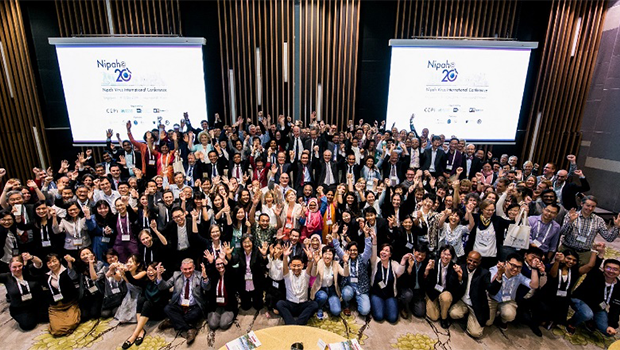SingHealth Institutions will NEVER ask you to transfer money over a call. If in doubt, call the 24/7 ScamShield helpline at 1799, or visit the ScamShield website at www.scamshield.gov.sg.
New conference to explore innovative solutions to combat global health threat posed by Nipah virus

• The Nipah Virus International Conference 2019—co-hosted by Duke-NUS Medical School (Duke-NUS) and the Coalition for Epidemic Preparedness Innovations (CEPI)—brings together world’s leading Nipah experts to strengthen international collaboration and improve world’s ability to combat the deadly virus
• Guest-of-honourDr Lam Pin Min, Senior Minister of State, Ministry of Transport and Ministry of Health, Singapore, to deliver the opening address
The threat of infectious diseases, such as Nipah virus, spreading across borders has increased substantially as a result of the ease of global travel. Nipah virus experts and stakeholders gather at the first international conference to commemorate the 20thanniversary of the virus’ discovery and to discuss innovative and effective solutions to combat the threat to global health security posed by Nipah virus.
Duke-NUS Medical School (Duke-NUS) and the Coalition for Epidemic Preparedness Innovations (CEPI) are co-hosting The Nipah Virus International Conference 2019 on December 9 and 10. The conference brings together Nipah experts and global health stakeholders to review past Nipah outbreaks, discuss the latest developments in diagnostics, vaccines and therapeutics, and foster greater international collaboration.
Guest-of-honour Dr Lam Pin Min, Senior Minister of State, Ministry of Transport and Ministry of Health, Singapore, will deliver the opening address. The conference guests include leaders and representatives from the Ministry of Health (Singapore), the World Health Organisation (WHO), Ministry of Health (Malaysia), the U.S. National Institutes of Health (NIH), Ministry of Social and Family Development (Singapore), Duke-NUS, CEPI, SingHealth and other key stakeholders from the healthcare and biomedical ecosystem in Singapore.
A growing threat to global health security
Nipah virus was first identified in 1999 during a large outbreak affecting Malaysia and Singapore. The virus is one of eight categories of diseases that the WHO has identified as epidemic threats in need of prioritisation. Over the past 20 years, the virus has continued to spread over thousands of kilometres to Bangladesh and India.
Nipah is a zoonotic virus, which means that it can be spread to humans from animals. It is spread primarily by bats (specifically Pteropus fruit bats) and pigs. It can also be transmitted through contaminated food and directly from person to person.
The virus causes severe disease, with recorded mortality rates in Malaysia, Bangladesh and India of between 40 and 90 percent. In 2001, the virus was detected in Bangladesh and since then, frequent outbreaks have occurred in the country. An outbreak in Kerala, India, in 2018 claimed 17 lives.
“There are currently no specific drugs or vaccines for Nipah virus infection, even though the WHO has identified Nipah as a priority disease for the WHO Research and Development Blueprint. Through the conference, we aim to stimulate dialogue between experts and stakeholders to bring about innovative and effective solutions to boost efforts in fighting Nipah virus,” said Professor Wang Linfa, Director of Duke-NUS’ Emerging Infectious Diseases Programme and Co-Chairman of the conference’s organising committee.
With global travel being more prevalent than ever, infectious diseases, especially those that can be transmitted from animals to people, can be rapidly spread across borders. Therefore, it is crucial to strengthen outbreak preparedness and response against infectious diseases such as Nipah.
One of the ways the conference aims to achieve that is by facilitating interaction between clinicians, veterinarians, scientists and public health experts from the region and beyond. Discussions such as these would help enormously in the communication, cooperation and collaboration between animal and human public health agencies to ensure that Nipah never becomes a global pandemic.
“Outbreaks of Nipah virus have so far been confined to South and Southeast Asia, but the virus has serious epidemic potential, because Pteropus fruit bats that carry the virus are found throughout the tropics and sub-tropics, which are home to more than two billion people. Nipah virus can also be transmitted from person to person, so in theory it could spread into densely populated temperate areas too,” said Richard Hatchett, CEO of CEPI.
“Twenty years have passed since its discovery, but the world is still not adequately equipped to tackle the global health threat posed by Nipah virus. This needs to change. Strengthening collaboration and knowledge sharing between Nipah virus experts, industry and key public-health stakeholders is crucial to the development of novel interventions against Nipah. As a co-host of the Nipah Virus International Conference 2019, CEPI is pleased to be able to foster such global collaboration,” he added.
WHO and the National Institute of Allergy and Infectious Diseases, one of the U.S. National Institutes of Health, are also key sponsors of this conference.
Keep Healthy With
© 2025 SingHealth Group. All Rights Reserved.



















